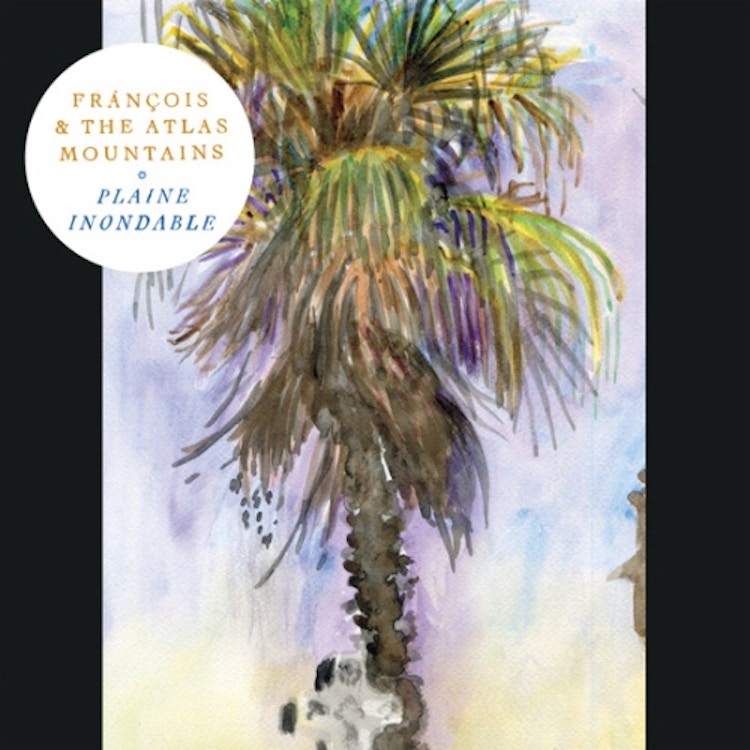Frànçois and the Atlas Mountains – Plaine Inondable
"Plaine Inondable"

The singer is French. The band is English (specifically, Bristolian). The drums are often African. The melody is informed by world music, folk, French pop, and everything in between. Frànçois and the Atlas Mountains make fondue of the world, and leave an aftertaste too good for toothpaste.
The band are re-releasing their second album, Plaine Inondable, and with it all the respiring gems and organic nuances that make each song a village unto itself. This is accomplished through webs of electric-acoustic guitar interplay, hearty piano chords, colorful ribbons of violin, song-serving percussion, handclaps, natural atmospherics, various found sounds (birds chirping, wind blowing, etc), and breathy, unpretentious harmonies.
In each song, an innocent-sounding nostalgia is conveyed, often through Frànçois’ earnestly fragile vocals, which tend to embody a prolonged sigh. Frànçois will seesaw between French and English – whichever the song calls for – while his accent lends a distinct, romantic quality over the music, adding an extra dimension by way of his immediately-audible cultural identity. When using his native tongue, his words have a habit of blending seamlessly with the instrumentation, taking away every subtextual distraction (for those listeners that don’t speak French, at least).
This happens in songs like ‘Be Water (Je Suis De L’eau)’ which sounds playful and innocent, like an entire childhood distilled, driven by sweet male-female harmonies, fidgety acoustic guitars, and flutes which chirp like birds on a sunny spring morning. Suddenly you want to be eight again, digging in the dirt for bugs, putting baseball cards in your bicycle spokes.
‘Friends’ has a different effect. It feels like a song of maturity, of having a job and bills to pay. Violins slump and sulk, while piano keys pull sympathy from your chest. The chorus however, tries its best to escape this rut, bouncing up and down against descending guitar-piano chords.
‘Do You Do’ sounds like a take on middle eastern folk music, filtered through FATAM’s inherent pleasantness and absence of conflict, imbued with a soft-skinned indie-folk nakedness. See the angelic boy-girl choir harmonies, shakers and other minimalistic percussion, well-hidden orchestral strings, and effervescent guitar-picking.
This band is proof that you can convey powerful emotions with modest apparel, and without ambushing the listener with a circus of affected sounds, that a handful of deliberately-picked-and-plucked instruments working in the same direction are enough. Hyperboles of understatement exist in songs like ‘Night and Day’ – a minute-long slice of a cappella which teems with life and choreography, and tells a story with voices and without words.
The album closer ‘Pic-Nic’ is a happy ending which cements and substantiates the effectiveness of the band’s less-is-more musical approach, containing no more than a lone (albeit busily-picked) acoustic guitar, Frànçois’ endearing vocal sentimentality, light (inexpensive-sounding) keyboards, and the occasional barking dog.
In addition to the attention paid to the rest of the world, the singer’s inescapable Frenchness often emerges, welcome, and intoxicating. We are treated not just to his accent and bilinguality, but also to the music associated with his country of origin. Songs like ‘Years of Rain’ (particularly its second half) call to mind a slinky, Paris-evoking Serge Gainsbourg ballad, with disaffected vocals that do the same, Brigitte Bardot’s bedside moaning the only thing missing from the picture.
We should hope that this reissue of the band’s second (of three albums in total) will be swiftly followed by a new release. Frànçois and the Atlas Mountains are a great treasure to keep in your pocket, even though they deserve to be so much more.
Listen to Plaine Inondable
Get the Best Fit take on the week in music direct to your inbox every Friday

Prima Queen
The Prize

Femi Kuti
Journey Through Life

Sunflower Bean
Mortal Primetime





